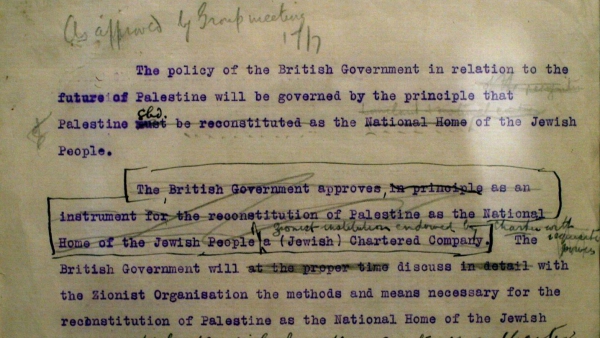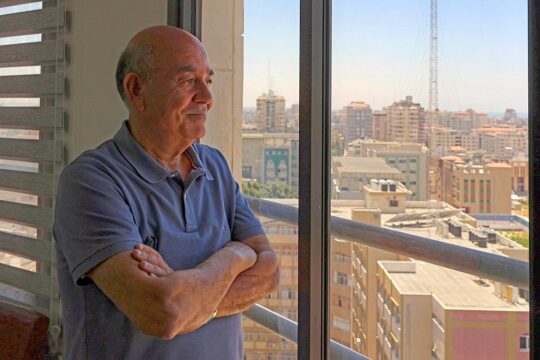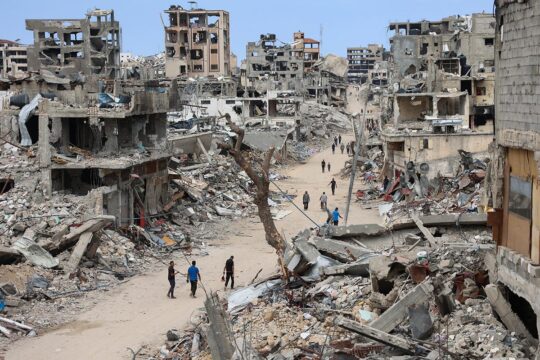Can the law correct the colonial past? That is the hope of Mahmoud Abbas, President of the Palestinian Authority, who plans to sue Britain in an international court for the Balfour Declaration nearly a century ago which gave a “national home” to the Jewish people.
In our troubled times, people are putting their hopes in the courts. Judges are inevitably called to decide one way or the other (guilty/ not guilty), so they appear the ultimate arbiters who can provide judgment, reason, sanctions and reparations. Hence the temptation, including for governments, to
turn to the judicial authorities on historic conflicts, so as to legitimize one version of the story over another. The latest attempt is by the Palestinian Authority, which announced at the Arab League summit in Nouakchott (Mauritania) at the end of July that it plans to sue Britain over the Balfour Declaration which on Palestine “gave people who don’t belong there (the Zionist movement) something (Palestinian land) which was not theirs”.
On November 2, 1917, British Foreign Secretary Lord Balfour wrote an open letter to Lionel Walter Rothschild, a leading figure of the Zionist movement, in which he said: “His Majesty's government view with favour the establishment in Palestine of a national home for the Jewish people, and will use their best endeavours to facilitate the achievement of this object, it being clearly understood that nothing shall be done which may prejudice the civil and religious rights of existing non-Jewish communities in Palestine, or the rights and political status enjoyed by Jews in any other country”.
At the Nouakchott summit, Palestinian Foreign Minister Riad Malki explained: "Almost a century has passed since 1917(... ) We are working to open up an international criminal case for the crime which they committed against our nation – from the days of the British Mandate all the way to the massacre which was carried out against us from 1948 onwards.” Later in the week, this was scaled down to the request for a formal UK apology to the Palestinians.
The Palestinian Authority’s threat to go to court is not in itself surprising. It is in line with Arab historiography which sees the Balfour Declaration as the initial act of plunder of Palestinian land granted to the Zionist movement by a colonial power and which led 30 years later to the Nakba and the creation of the State of Israel. Already in 2013, the Palestinian Authority declared the Balfour Declaration a crime against humanity. Its statement said “Britain and the entire world must recognize the usurped Palestinian rights because everything that has befallen Palestine – it’s partition, the aggression, the suppression, the settlements, the arrests, the separation wall, the siege on Gaza, and the millions of Palestinians living in exile – was made possible because of the Balfour Declaration”.
The Palestinian Authority knows it is highly unlikely that an international court will declare itself competent to pronounce on the Balfour Declaration -- issued a hundred years ago by a former colonial power -- and even less to establish a link between the 1917 Declaration and the exodus of Palestinians in 1948. The aim is to use the judicial threat to get media attention at a difficult moment for the Palestinian Authority. It is symptomatic that President Abbas chose the Arab League Summit to threaten London with legal action. The peace process has been dead for a while and many Arab countries – including Egypt and Saudi Arabia – have geostrategic interests in common with Israel and are worried like Israël about the threat from Iran and the so-called Islamic State.
Israeli daily newspaper Haaretz interprets the Palestinian declaration as a “cry of anger and despair” in the face of an Arab world which currently has priorities other than the Israeli-Palestinian conflict. And no-one can see British Prime Minister Theresa May apologizing for the Balfour Declaration at a time when London’s priority is Brexit negotiations. The Foreign Office said simply that the UK would “mark” rather than “celebrate” the 100-year anniversary of the Balfour Declaration, thus adopting an unsurprising middle position. As for the Israeli government, it slammed what it dubbed a new attempt to “delegitimize” Israel after several attempts by the Palestinian Authority to challenge Israel before the International Criminal Court (ICC). The ICC has not yet determined its position. But when asked about this, ICC Prosecutor Fatou Bensouda said in an interview with JusticeInfo that she would act according to “the nature of crimes according to ICC Statutes, where they have been committed, the gravity of those crimes (…), the issue of complementarity and the interests of justice”.
Historic confrontations are likely to intensify in coming months. November 2016 will mark 60 years since the Suez crisis, which Egypt calls the “Tripartite Aggression”, when Israel, Britain and France attacked Egypt after it nationalized the Suez Canal. Then 2017 will mark 100 years since the Balfour Declaration, and 50 years of Israeli occupation after the Six-Day War. So long as there is no prospect of a peaceful settlement, the battle of remembrance is likely to continue.





